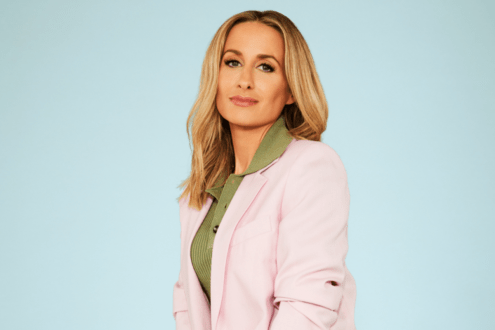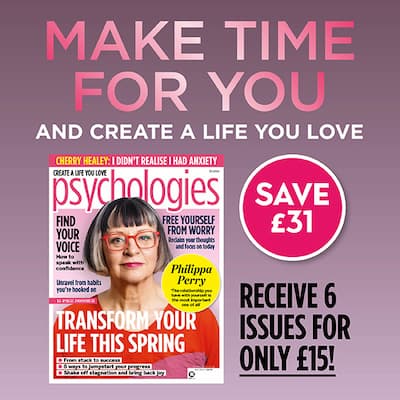Do you need antidepressants?
When anxiety overwhelmed Heidi Scrimgeour, medication proved a lifeline. But she wanted to dig deeper – why had this happened? And had it really come out of the blue?

6 minute read
Hitting the age of 40 without taking ‘happy pills’ was a point of personal pride. I’d always thought of myself as someone who didn’t ‘do’ anxiety or depression – until I found myself in my doctor’s surgery, begging for something to make the unbearable feelings stop.
A series of stressful life events – from family conflict to criticism at work – had converged, until a difficult conversation used up the last of my emotional reserves, and I was suddenly completely overwrought, unable to stop crying.
I moved through that weekend in a daze, unable to focus on anything except the dread. We visited a theme park (a pre-arranged trip) and I froze when my husband suggested I wait with our daughter while he took our boys on a ride. ‘I can’t,’ I whispered. ‘What if she floats away?’
I wept with relief when my GP handed me a prescription for anti-anxiety medication and prayed that it would restore me to the calm state I had always taken for granted.
Looking at my friends, it surprised me to realise how many of them also felt totally overwhelmed, which made me wonder if anxiety was telling us something about our lives. It’s too trite to conclude that we’re suffering the fallout of the women-can-have-it-all myth that we grew up with, but might there be something in that? We expect so much of ourselves, then chastise ourselves for failing to meet our own unattainable standards. I had to find a way to address the level of anxiety that my life had created.
Living off-grid to prevent emotional burnout isn’t an option for most of us, but I felt compelled to make changes in the hope of ensuring I never found myself at crisis point again. Medication soothed the physical symptoms of anxiety, but I soon realised drugs could only take me so far. To fully recover, I’d have to understand how I’d got here. What had tipped me into a state of acute anxiety wasn’t just a chemical imbalance, after all.
Healing dual carriageway
This is an idea explored by Johann Hari in Lost Connections: Uncovering The Real Causes Of Depression And The Unexpected Solutions (Bloomsbury, £16.99). He writes that societal over-reliance on medication for anxiety and depression is akin to treating patients like a ‘machine with malfunctioning parts’ or offering people ‘a menu with only one option’. My GP stressed the importance of working on myself to discover the source of my anxiety, alongside medication. So I turned to Eve Menezes Cunningham, an integrative therapist who specialises in psychosynthesis counselling, and author of 365 Ways To Feel Better: Self-care Ideas For Embodied Wellbeing (Pen & Sword Books, £14.99). She agreed to work with me via weekly video counselling sessions for six weeks to help me understand why I’d been blindsided by anxiety, and how I could rebuild my emotional resilience.
I dreaded that first session. It lasted for 90 minutes and consisted of her asking me questions to build a picture of both my situation and which practical tools might help. She asked about everything from my medical history to whether I’d ever contemplated harming myself. I squirmed under the scrutiny and felt oddly guilty for absorbing so much of someone else’s attention. Yet, by the end, I felt supremely calm, safe and at ease.
Those feelings – like a soothing balm to a person whose nervous system has been ravaged by spiralling panic – grew with each session. Cunningham encouraged me each week to start by talking through how I was feeling and where my anxiety level was. Simple questions, but they untapped something in me that had felt locked up; as if she was giving me permission to feel whatever I was feeling. I realised I had been trying to ‘unfeel’; as if denying the existence of anxious thoughts might make them go away. It became obvious that this was the approach that had brought me to my unravelling in the first place. I’d been dealing with unmanageable degrees of stress without facing the impact they were having on me; stoically coping instead of recognising the pressure that was building. Talking candidly helped me see that this was why one difficult conversation was all it had taken to finally make my mind and emotions implode.
Control through care
Had I been checking in with myself to consider how I was feeling, and what those feelings indicated about my needs, as Cunningham taught me to do, I don’t think I’d ever have got to that crisis point. Of course, without it, I’d also never have learned to take better care of myself.
At first, I felt scared to consider how I was feeling. Tentatively, I’d poke around in the undergrowth of my mind, checking to see what was lurking in the bushes. It sounds absurd, but I was anxious about feeling anxious. Yet observing out loud that my anxiety level was high and giving it a rating out of 10 helped minimise it and make it feel manageable.
Cunningham armed me with tools and techniques for dealing with stressful situations and managing anxious feelings, but by far the most potent thing she taught me was that I am worthy of self-care. I no longer feel guilty for lying on the sofa when I could be tackling the laundry. I had fallen into a dangerous rut of attending to everything except my own wellbeing, and my mental health had paid the price. It almost doesn’t matter what I do to take better care of myself: a brief meditation to check in with myself after a busy day; a lunchtime walk despite looming deadlines; or a moment spent staring into space without berating myself. It’s simply that I now prioritise small ‘selfish’ acts and habits that cultivate a calmer, healthier state of mind.
Deep down, I don’t think I believed I was worthy of self-care until she made me realise it. The compassionate tone with which she asked how I was feeling, and the non-judgmental sense of empathy she exuded when I voiced my fears, mistakes and inadequacies, helped restore me to myself. If you’ve been resolutely denying your own needs or feelings to prioritise other people’s, it’s inevitable you’ll pay a price. Anxiety meant jolting awake mid panic attack, with a suffocating sense of terrifying doom weighing on my chest.
Shifting the burden
As the medication took effect, that weight was still part of my consciousness, but its proximity changed, creating space to get racing irrational thoughts under control even before the day began. Gradually, I started to feel as if that weight was on the bedroom floor instead of on me. Week by week, it shifted further away – outside the bedroom door, downstairs, outside the house, across the street and, eventually, several streets away, far from sight.
Now, I feel like it’s in another country – anxiety’s existence is a reality I acknowledge daily but its proximity no longer feels like a threat. Cunningham helped me feel strong enough to pinpoint its location, and I grew less afraid of it every time I noted it had drifted further from me. Before therapy, I felt like I was treading water. I was grateful for the way medication numbed the physical intensity of anxiety, but I lived in fear that it would find its way back to me. In contrast, I ended our sessions feeling confident that I have a range of tools to help me avoid going back to the depths of despair.
I might not be able to ‘congratulate’ myself for not needing treatment for depression or anxiety any longer, but I’ve realised that those who seek it, in any form, are the brave and strong ones.
Find out more from Eve Menezes Cunningham at selfcarecoaching.net
Image: Getty









